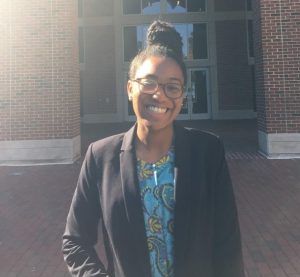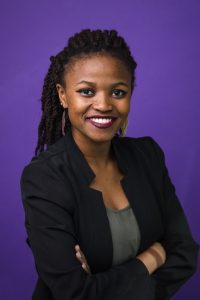Via our Underrepresented Majors (URM) Fund, the Economics Department sponsored the attendance of three UNC Economics majors to the second annual Sadie Conference on February 20-22, 2020 in Washington DC. Attending were Fridah Mbwaya, Victoria Quiett, and Hayle Tyson. We asked the women to share how the experience aided their application of tools and concepts that they are learning in the Economics major? Did the experience provide ideas about projects or research in economics? In light of current events that are bringing racism to the forefront of people’s minds, did they learn anything from the conference (or these events) that has changed the way they will approach their continued economics training?
 Hayle shared the following:
Hayle shared the following:
“It was refreshing to see more women of color pursuing careers in economics and economics-related fields. The experience itself didn’t necessarily aid in my application of tools and concepts I’m learning in the Economics major as I went to breakout sessions that were focused on what you can do with an economics major. With that being said, the experience encouraged me to explore research opportunities and look at grad school programs. The experience did give me ideas about projects and research in economics. Prior to attending the conference, I didn’t think I could explore topics that were of interest to me within economics but a lot of the speakers at the conference spoke about researching the intersection of race and economics, which was eye-opening to me. Now, whenever I have a question or an idea I want to research, I write it down in my journal. Unfortunately for me, I’m already in my senior year and don’t have the requirements for writing an honors thesis so I can’t explore these ideas now but ’m looking at grad school options.”
“The current events have not changed the way I will approach my continued economics training. Although these events are bringing racism to the forefront of a lot of people’s minds, I would say racism has always been on mind. Furthering equity and changing flawed systems is important to me. This passion is evident in my participation in student organizations on campus. As a voter registration captain for Young Democrats, I helped people register to vote. As co-president of Period at UNC, I collect and donate menstrual products to those in need as well as educate people on the stigmas surrounding menstruation.”
“I encourage other economics students to attend the conference.”
Fridah shares:
How did the Sadie Conference experience aid your application of tools and concepts that you are learning in the Economics major?

“As I had just taken Intro to Macroeconomics the previous semester, I felt this course gave me enough grounding to keep up with much of what the speakers touched on. Throughout the conference, there were multiple opportunities for us as students to engage with this higher-level academia: I attended many mini-sessions where masters students went over the kinds of research they were doing and gave us an in-depth understanding of their findings, we attended panel discussions with researchers from different think-tanks in DC and they spoke to their type of research and the kind of impact they were able to foster, we had mentorship sessions with specific panelists based on our interest. All in all, this conference was the perfect introduction to the different career paths in Economics and related fields and provided a pathway for me to start thinking about the specific path I would like to take.”
Did the experience give you ideas about projects or research in economics?
“The conference definitely opened my eyes to the possibility of pursuing a Master’s or Ph.D. in an Economics field and helped open my eyes to the specific topics I enjoyed engaging over. I was engaged in matters of race and public finance, the allocation of public funds, and other social and economic issues. Personally, I have always been interested in understanding international and developmental economics at a deeper level. From this conference, I received valuable contacts and useful resources that aided my search in potential research opportunities. As an international student, I have been able to see first hand, the drastic differences between the quality of life in the US and Nairobi, Kenya – where the rest of my family currently resides. Taking on this social lens when trying to understand economic differences, I was able to begin asking myself potential questions that could aid my understanding of developmental economics. While I am still nowhere close to having a final research topic, this conference was the first step in understanding the field of Academia and the ways I could begin interacting with it. “
In light of current events that are bringing racism to the forefront of people’s minds, has anything you learned from the conference (or these events) changed the way you will approach your continued economics training?
“The conference did an excellent job of exploring the ways underrepresentation, especially from female POC, in fields of research can greatly misinform the public view on social issues. Currently, there is a small but growing community of Black Economists whose job has now become to properly represent the issues of black communities – a job that was previously being handled by white academics. If such research is misreported or if the underlying causes are not well understood, poor research can create negative ripple effects, especially in communities of color, since they would be underfunded and undersupported.”
Is there anything else you’d like to share about your participation in the Sadie Conference?
“This was an exciting entry-level conference that opened my eyes to the world of Academia, especially as a woman of color. This is an excellent opportunity for Black Women to interact and learn from people who are just like them. It was inspirational to see the kind of potential that exists in the world, especially in the world of Academia, and interact with people who could support my journey to getting there. I would urge every black woman who is studying Economics or any related field in research, to consider going for this conference.”
Hayle added that, “I wouldn’t have been aware of the conference, if I hadn’t seen the details included in an Economics department email.” The Economics Department hopes to encourage more students from underrepresented groups to explore the discipline of economics and to apply that training to their interests.